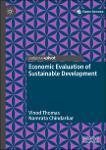Search
Author
- Chindarkar, Namrata (1)
- Inter-American Develop... (1)
- Köhn, Doris (1)
- Thomas, Vinod (1)
- next >
Subject
- Economic Policy (1)
- Environmental Sustaina... (1)
- Finance (1)
- Financial Economics (1)
- next >
Date issued
Has File(s)
- true (3)
Search Results
Why should people - and economies - save? This book on the savings problem in Latin America and the Caribbean suggests that, while saving to survive the bad times is important, saving to thrive in the good times is what really counts. People must save to invest in health and education, live productive and fulfilling lives, and make the most of their retirement years. Firms must save to grow their enterprises, employ more workers in better jobs, and produce quality goods. Governments must save to build the infrastructure required by a productive economy, provide quality services to their citizens, and assure their senior citizens a dignified, worry-free retirement. In short, countries must save not for the proverbial rainy day, but for a sunny day - a time when everyone can bask in t... |
This book presents methods to evaluate sustainable development using economic tools. The focus on sustainable development takes the reader beyond economic growth to encompass inclusion, environmental stewardship and good governance.
Sustainable Development Goals (SDGs) provide a framework for outcomes. In illustrating the SDGs, the book employs three evaluation approaches: impact evaluation, cost-benefit analysis and objectives-based evaluation.
The innovation lies in connecting evaluation tools with economics. Inclusion, environmental care and good governance, thought of as “wicked problems”, are given centre stage. The book uses case studies to show the application of evaluation tools. It offers guidance to evaluation practitioners, students of development and policymaker... |
This book focuses on the achievements, current trends and further potential of microfinance to scale-up and serve many more clients with financial services that enable them to improve their living conditions. The book asks what it takes to achieve sustainable impact: to know your clients and to understand their needs, to treat them in a fair and transparent way, and to safeguard the synthesis between the financial and social dimension of sustainable microfinance. The book also sheds light on the future funding landscape and what is necessary to bring more commercial funders on board while ensuring that these new funders will continue the commitment to responsible finance. While being forward looking, the book reflects the debate on core values of microfinance, triggered by recent cr... |



